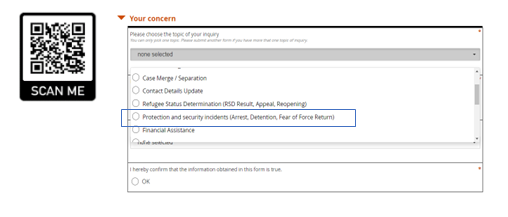LEGAL PROTECTION HOTLINE: 0811 9840 643
UNHCR can provide support to refugees and asylum seekers experiencing legal protection concerns. The Legal Protection Hotline is available for individuals experiencing an emergency in Indonesia, particularly when they are at risk of refoulement, arrest, and detention. The hotline is open to individuals seeking international protection regardless of whether they have been able to register with UNHCR and is free of charge.
If you are experiencing grave threats to your safety or you are at high risk of deportation, please text or call the UNHCR Indonesia Legal Protection Hotline for help.

